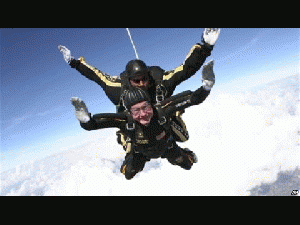George H.W. Bush, known to family and friends as "Poppy," celebrated his 90th birthday this year parachuting from a helicopter, one of several jumps he's made to mark his birthdays with a nod to his career as a WWII naval aviator. He made his first jump on Sept. 2, 1944, when the plane he was flying got hit by Japanese fire over the Pacific. His escape by parachute became an essential part of his image as a war hero, a status that fueled his political ambitions.
Here to mark the 70th anniversary of Bush's first jump is an excerpt from WhoWhatWhy Editor-in-Chief Russ Baker's bestseller, Family of Secrets: The Bush Dynasty, America's Invisible Government and the Hidden History of the Last Fifty Years. This section of Chapter 2 examines the enduring discrepancies surrounding Bush's story of survival over the Pacific.
(Note: Although this excerpt does not contain footnotes, the book itself is exhaustively footnoted and sourced.)
A Changing Story
The enveloping fog extends even to Poppy Bush's most sterling political symbol: his record as a war hero. On September 2, 1944, the plane he was piloting was hit by Japanese ï � �re during a bombing run over Chichi Jima, a small island in the Paciï � �c. Bush successfully parachuted to the ocean surface, where he was rescued. His two crew members perished.
A documentary ï � �lm about the rescue was aired as part of a 1984 Republican Convention tribute to Vice President Bush. And on September 2, 1984, forty years to the day of his doomed bombing mission, a ceremony was held at the Norfolk Naval Station, complete with a Navy band and an encomium from Navy Secretary John Lehman. Bush's war service, Lehman declared, was the beginning of a career "which went on to mark some of the most remarkable achievements in the annals of American politics."
The real story turns out to be far more complicated. In particular, there are two unresolved issues: What did Bush know of his crew members' fate? And how badly was his plane hit at the moment when he decided to bail out? These are not merely hypothetical: as the pilot, Bush's decision to ditch the craft would have doomed anyone still on board. Navy regulations dictate that ofï � �cers who are thought to have abandoned crew members could be court-martialed.
On board with Bush that day were Radioman Second Class John Delaney, situated below in the plane's belly, and, directly behind Bush, the turret gunner Lieutenant Junior Grade William Gardiner "Ted" White. Bush would claim in an early 1980s interview with author Doug Wead that he had seen at least one parachute leaving the plane.
In 2002 he told the author James Bradley that he had not known the fate of either of his crew members. After Bradley had ï � �nished conducting an interview with Bush for his book Flyboys: A True Story of Courage, the former president turned to the author and asked if he had any information on the fate of his two crewmen.
"It still plagues me if I gave those guys enough time to get out," Bush said.
Bradley would later write in his book: "No one knew exactly what had happened to Ted and John that day, only that both of them died."
Yet Poppy has offered multiple conï �?icting versions of the episode. In a letter to his parents following his rescue, Poppy asserted that after the plane was hit, he had ordered his crew members to parachute out. He was uncertain what happened next, he claimed, due to the smoke that ï � �lled the cockpit:
They didn't answer at all, but I looked around and couldn't see Ted in the turret so I assumed he had gone below to get his chute fastened on.
Another version surfaced in the 1980s, when his staff decided that Bush had previously been too modest and now needed to acknowledge his heroism.
They hooked him up with a writer, Doug Wead, who prepared the book George Bush: Man of Integrity. In that book, which got little attention, Poppy says:
I looked back and saw that my rear gunner [White] was out. He had been machine-gunned to death right where he was.
(Note: You can view every article as one long page if you sign up as an Advocate Member, or higher).





